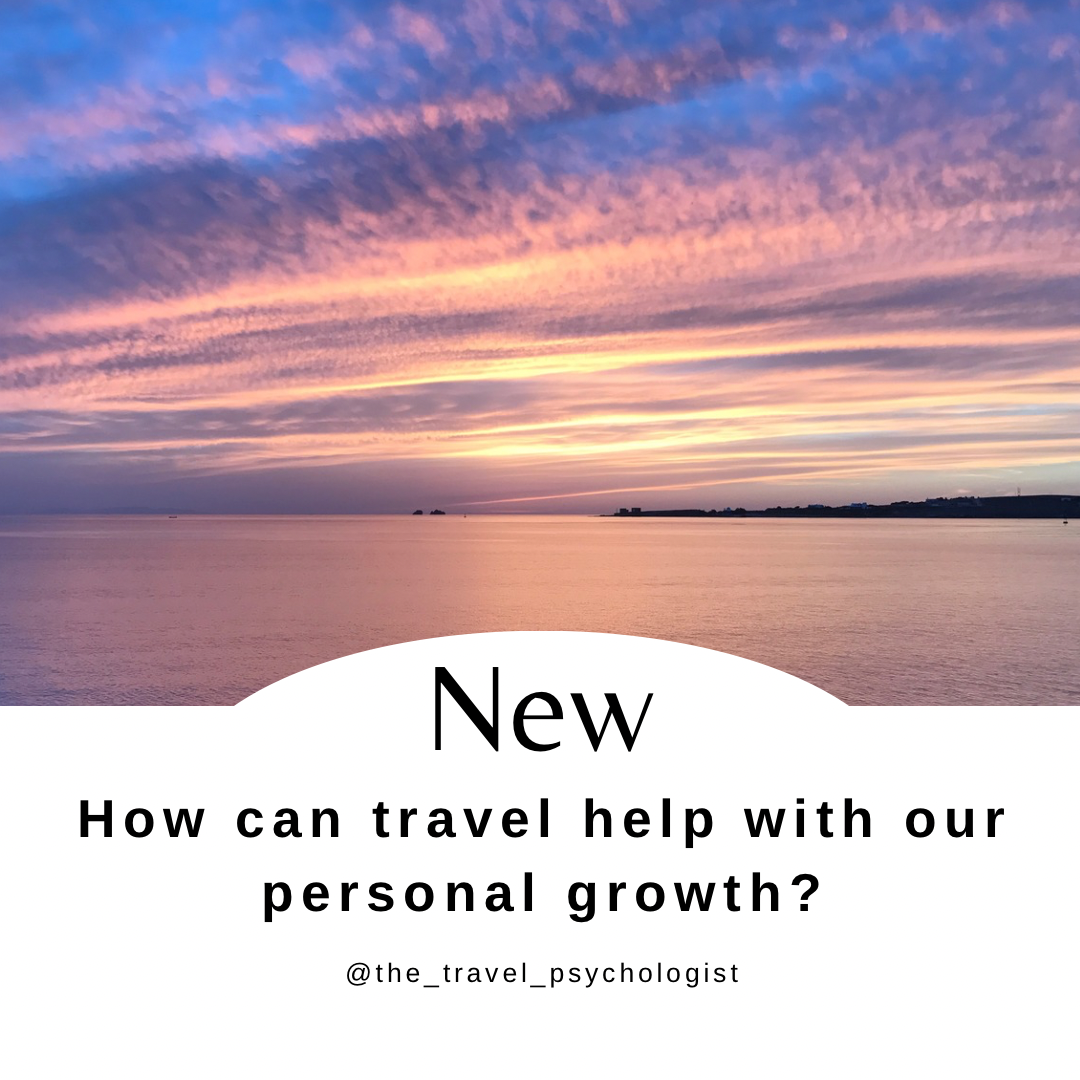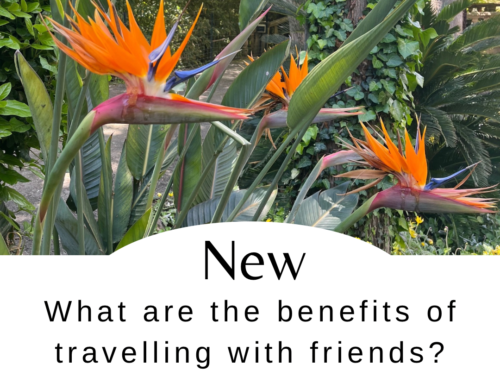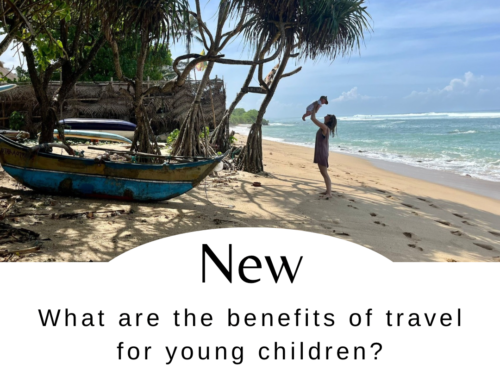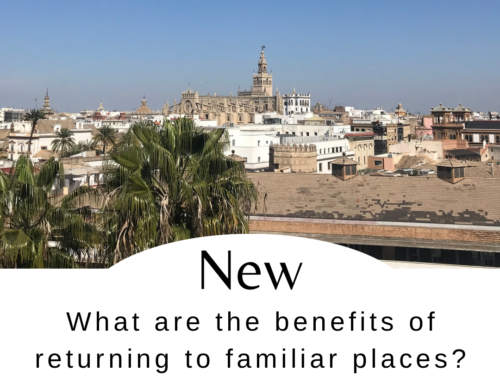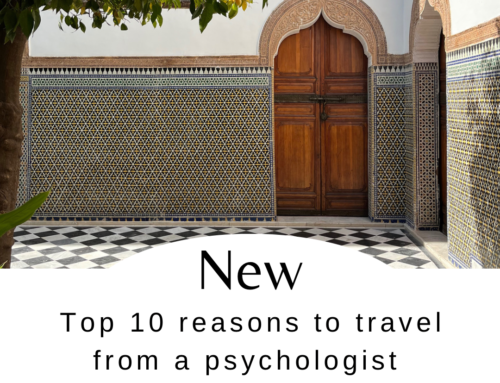Travelling involves new situations, new cultures and new experiences all of which can help us to grow. In this article, three psychologists share how travel can help with our personal growth and provide tips on how to grow from your trip.
By Dr Charlotte Russell, Clinical Psychologist & Founder
I am a strong believer in how travel can help with our personal growth. Challenging ourselves does not always feel good in the moment, but is how we can stretch ourselves and grow as a person. Here are three ways that I think travel can help with personal growth.
Self-efficacy
When we put ourselves in situations that are new and challenging this can help us to build confidence. We can also build self-efficacy (Bandura, 1977), which is when we have positive beliefs about our own ability to deal with new and challenging situations, and to achieve goals. Self efficacy is about having a ‘can do’ attitude about the effects of our own behaviour to manage situations in life.
Foreign travel certainly provides opportunities for building self-efficacy; we are almost always dealing with different situations, languages and cultures as we navigate around the world. Importantly, self-efficacy can be important for our ability to tackle challenges and our resilience. In one recent study, it was shown that those who travelled more actually performed better at work, and one of the reasons for this was increased self-efficacy (Miyakawa et al., 2019). This was a small study and the area requires more research but it gives us an initial indication that travel can have important benefits for our personal growth and development.
The best advice for building confidence and self efficacy when you travel is to stretch yourself. Aim for situations that feel a little bit uncomfortable rather than stretching yourself too far.
Gaining perspective – we are part of a bigger world
Travel can also help us to put life’s challenges into perspective. I’m going to share a client example here as it is the best way I can think of to illustrate my point. I once worked with a gentleman who had post trauma symptoms following a terrible accident and injury. As part of therapy for these kinds of difficulties I teach grounding techniques to deal with flashbacks. This involves putting yourself in the ‘here and now’ when a difficult memory from the past may be trying to take hold. My client had explained that one thing that had helped him was to focus on the old oak trees in the park nearby, and to remind himself that they were there before he was born and would be there for many years after he was gone. Not only did this help him to reconnect with the here and now, it helped him to appreciate that the world/nature/life is much bigger than him and will continue on, and that provided a helpful sense of perspective.
It’s a similar phenomenon to how I feel when I’m in a small village in Greece or Spain; I know that life there will continue when I’ve left, and that provides a sense of comfort and perspective somehow. Having this perspective can help us to deal with challenges more successfully and can also increase our resilience.
Taking time to slow down and observe what is around you can help you to gain this sense of perspective. Too often people rush around sightseeing and don’t stop to observe local life and customs. You need some time and some stillness to really be able to absorb the place.
Gaining perspective – appreciating different viewpoints
It is well known and appreciated that interacting with other people that are different to us can help us to appreciate different perspectives. Travel, and especially longer trips where we immerse ourselves in another culture are great ways to really understand different cultural perspectives and ways of viewing the world.
Experiences that increase our ability to appreciate the perspective of others can supercharge our personal growth. These abilities lead to better problem solving, interpersonal interactions and the ability to work collaboratively with others. It’s yet another way that travel can make us better at life!
Taking time to learn about other cultures and customs is the best way to help yourself to understand different perspectives. This can involve hiring a local guide and chatting to local people whilst you are travelling.
Dr Maja Jankowska, Clinical and Counselling Psychologist at Expansion Psychology
Travelling is one of the most marvellous ways of taking yourself out of your comfort zone and into the unknown and exciting. affords you with opportunities to explore new places, cultures, languages, foods and ways of being. Learning from travelling can be immense.
However, leaving the unfamiliar environment of your own home can mean experiencing the discomfort of the new and unfamiliar. It could make you feel less confident, self-assured, assertive, capable or even outright anxious. Unexpected challenges encountered when travelling may force you to think on the spot, change your plans and cause anxiety and fear. You might, at times, feel overwhelmed and exhausted, missing home, familiarity and usual comforts. You may question why you even left or why you are putting yourself through this challenge. It’s perfectly ok to feel this way and many people do, at times, when faced with challenges that travel can throw. The fear is a normal state nervous excitement that comes with trying something new, which can afford personal growth.
Try to speak to yourself compassionately. Remind yourself gently that although travelling is exciting and horizon broadening, you, just like everyone else, will inevitably face some challenges and problems. You may experience discomfort or even conflict but embracing the challenge and pushing against your limits may truly help you improve and develop yourself. I like to say to myself a little mantra: every day in every way I’m becoming better and better (you may want to be specific by adding e.g. in problem solving, dealing with uncertainty, overcoming my anxiety, etc.).
And if you ever feel stuck or fed up, that’s ok, we all feel this way from time to time. Revisit your values and remind yourself why you are doing this. Think of all the reasons why you travel and what you have gained from your travels. It’s a great motivator! You can also play a game of turning a negative into a positive – one can find something good even in the most miserable situation! Also keep your eyes on ‘the prize’: nee knowledge, personal growth, improved problem solving, confidence in self, adaptability, network building or perhaps even a business opportunity and much more. Focusing on your values, benefits and rewards is often a strong motivator to continue. But if you’ve reached your limits, it’s also important to honour your boundaries. It’s ok to say I’ve had enough, learned enough, experienced enough and now I can go back to the safety and comfort of my home. … Until I travel again!
Dr Ravi Gill, Health Psychologist at Smart Mind Health
Travelling requires us to constantly step out of our comfort zone; visit new places, embrace new cultures, this helps to contribute towards a growth mindset.
Understanding and participating in local traditions can broaden your cultural awareness and empathy. Engaging with local cultures provides us with insight into different ways of life and helps break down cultural barriers. Even attempting to speak a new language can improve your communication skills and show respect to locals. If communication causes some nerves perhaps explore communication through body language and learning to express yourself without words.
Traveling often involves overcoming unexpected obstacles, which can improve your problem-solving abilities and resilience. It offers opportunities to look at problems from a different perspective and assess resources to help you solve any concerns. Being in new environments teaches flexibility and adaptability, essential skills in both personal and professional life. Learning to cope with the unknown builds mental strength and a more open-minded approach to life.
Solo travel fosters self-reliance and boosts confidence as you manage on your own in unfamiliar settings. Making travel decisions enhances decision-making skills and self-assurance.
Seeing how people live in different parts of the world can foster gratitude for what you have and humility in understanding global disparities. Travel often highlights the beauty in simple experiences, enhancing your appreciation for everyday moments.
Travel encourages you to live in the moment and fully experience your surroundings. Take time to observe and appreciate the details of your travel experiences, which can enhance mindfulness in your daily life. Try and continue this practice when you return.
By actively engaging in these practices, you can maximize the personal growth opportunities that traveling offers.
Conclusion
Travel can bring a wide range of benefits for our personal growth including our problem solving, confidence, ability appreciate different perspectives and adaptability. Given all of these benefits, it can help to have a way of reflecting on your experience and process of learning. Did you know that journaling is one of the most effective ways to facilitate this process? For more on this check out Travel journal prompts: guidance from a psychologist.
You can also join our growing community by joining our Facebook group dedicated to Female Travel and Personal Growth.
References
Bandura, A. (1977). Self-efficacy: toward a unifying theory of behavioral change. Psychological review, 84(2), 191.
Johnson, D.W. (2019) The Importance of Taking the Perspective of Others | Psychology Today
Kim, J. (2018) Why Travel Is Good for Your Mental Health | Psychology Today
Miyakawa, E., Kawakubo, A., & Oguchi, T. (2019). Do people who travel more perform better at work?. International Journal of Tourism Research, 21(4), 427-436.

